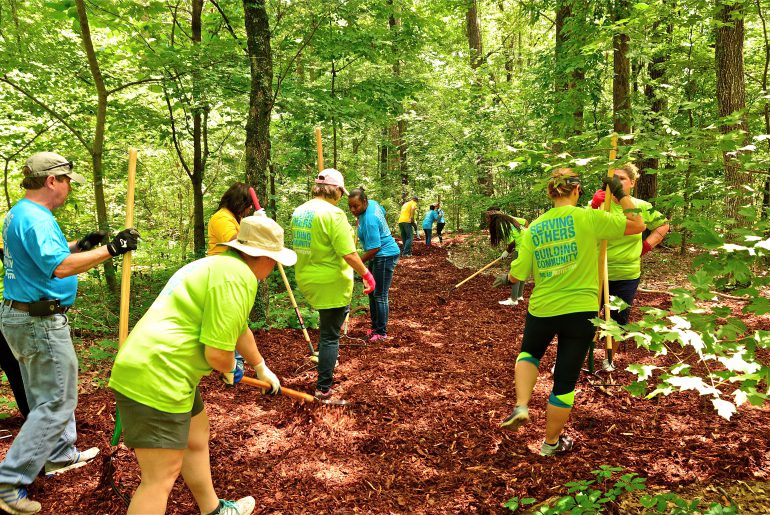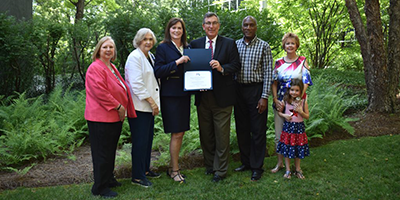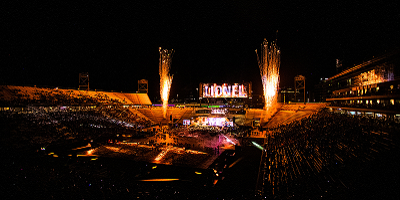What is one of the first steps to building better relationships at work, in your personal life and in your community? Understanding the experiences, achievements and struggles of your peers. By learning more about others, we can achieve great things together.
This is especially true as we celebrate Black History Month.
The Black community long struggled for freedom and equal opportunity, a struggle that continues in some ways to this day. Whether you are familiar with the struggles of Black Americans or would like to increase your knowledge, Black History Month serves as a profound reminder that understanding the past can help shape the future.
With offices throughout the country, including Birmingham, Cincinnati and St. Louis, our Protective family has access to a number of Black history resources and experiences right in the communities where we live and work. Here are seven places where you can learn more about the achievements of Black Americans and the roles they have played in the history of the United States.
Birmingham Civil Rights Institute (Birmingham, Alabama)
The Birmingham Civil Rights Institute is a cultural and educational research center that promotes a comprehensive understanding for the significance of civil rights developments in Birmingham. It is an affiliate of the Smithsonian Institution and designated as part of the Birmingham Civil Rights National Monument, along with the A.G.Gaston Motel, Kelly Ingram Park, 16th Street Baptist Church and Bethel Baptist Church.
Consistently rated as one of the top two attractions in the Birmingham area by visitors on Tripadvisor.com, the Institute offers 58,000 square feet of archives, galleries, community meeting rooms and changing exhibition spaces.
Plan your visit to the Birmingham Civil Rights Institute.
16th Street Baptist Church (Birmingham, Alabama)
Organized in 1873, 16th Street Baptist Church was the first black church in Birmingham. It was originally located on 12th Street North and 4th Avenue, and the congregation moved to its current location in 1880.
The church served as a central meeting location in the 1960s during the Civil Rights Movement, and received worldwide attention when on Sept. 15, 1963, a bomb killed four young girls and injured 20 other church members.
The church reopened in June 1964. A memorial gift from the people of Wales, a stained glass window depicting a Black crucified Christ, can still be seen today in the rear center of the sanctuary at the balcony level.
Tours of 16th Street Baptist Church are available to the public by appointment.
Birmingham Negro Southern League Museum (Birmingham, Alabama)
The Negro Southern League Museum presents the history of African-American baseball and recognizes the league’s impact on Birmingham, Alabama and professional baseball as a whole.
In the spirit of the players’ ability to inspire people of all races and transcend barriers, the museum seeks to evoke a broad sense of community and create cultural and educational experiences that acknowledge the past, embrace the present and frame the future.
The museum features the largest collection of original Negro League baseball artifacts in the country, as well as an on-site research center with seven of the top researchers in Negro League and Southern League baseball history.
Learn more about visiting the museum.
Rickwood Field (Birmingham, Alabama)
Hailed as “America’s Oldest Baseball Park,” Rickwood Field opened in 1910 and later became home to the Black Barons, a team that drew thousands of spectators eager to see Negro League stars such as George “Mule” Suttles and Leroy “Satchel” Paige. Future hall of fame player Willie Mays grew up not far from Rickwood Field and played for the Black Barons as a teenager.
Rickwood Field is on the National Register of Historic Places. The park hosts tours and events throughout the year.
Southern Museum of Flight (Birmingham, Alabama)
The Southern Museum of Flight is one of the largest aviation museums in the Southeast, and is dedicated to presenting civilian, military and experimental aircraft and memorabilia from the earliest history of powered flight. The museum houses over 100 aircraft, as well as engines, models, artifacts, photographs and paintings. It’s also home to the Alabama Aviation Hall of Fame.
One of the most intriguing exhibitions inside the 75,000-square-foot facility is an inspirational diorama honoring Alabama’s famed Tuskegee Airmen, the first African-American military aviators in the United States Armed Forces.
Find out more about visiting the Southern Museum of Flight.
National Underground Railroad Freedom Center (Cincinnati, Ohio)
The National Underground Railroad Freedom Center presents permanent and special exhibits, public programming and educational resources that reveal stories of freedom’s heroes, from the era of the Underground Railroad to contemporary times.
The center features an implicit bias learning lab, theaters where visitors can view thought-provoking films, and many other immersive and interactive experiences tracing the story of slavery from before the Civil War in the United States to modern day slavery around the world.
Plan your visit and learn more about the National Underground Railroad Freedom Center.
The Griot Museum of Black History (St. Louis, Missouri)
The Griot (named for an African word for a highly respected member of the community who upholds cultural traditions) is a small museum that aims to make a big impact. In addition to its permanent collection, the museum hosts local and national traveling arts and humanities exhibits and sponsors community education projects, gallery talks and cultural celebrations.
The Griot uses wax figures, art, artifacts and memorabilia to interpret the stories of African Americans who have contributed to the development of the United States. Visitors can learn about Carter G. Woodson, Josephine Baker, Dred and Harriet Scott, Martin Luther King, Jr., Miles Davis and others.
The Griot's interpretative program includes an authentic slave cabin, originally built on a plantation in Jonesburg, Missouri. Visitors can solve puzzles, view documentary videos and participate in other interactive experiences.
Learn more about visiting The Griot Museum of Black History.
DuSable Museum of African American History (Chicago, Illinois)
Since 1961, the DuSable Museum of African American History in the historic Hyde Park area of Chicago has sought to promote understanding and inspire appreciation of the achievements, contributions and experiences of African Americans. The museum is named for Jean Baptiste Point DuSable, a Haitian of African and French descent, who established the trading post and permanent settlement which would become known as Chicago
Home to 15,000 pieces, including paintings, sculpture, print works and historical memorabilia, the museum also hosts special exhibitions, workshops and lectures.
Be sure to check the museum’s website for updates on hours of operation and planning your visit.
Observances like Black History Month serve as necessary reminders about the importance of celebrating the contributions of all people. But there’s no reason why you can’t embrace a mindset of continuous learning year-round. Whether you visit a cultural center or landmark like the ones mentioned above or expand your knowledge in other ways, you will be sure to benefit from having a better understanding of varied traditions, heritages and experiences.
Want to learn more about the unique experiences of our Protective family? Read about our Days of Understanding celebration.





 To exercise your privacy choices,
To exercise your privacy choices,